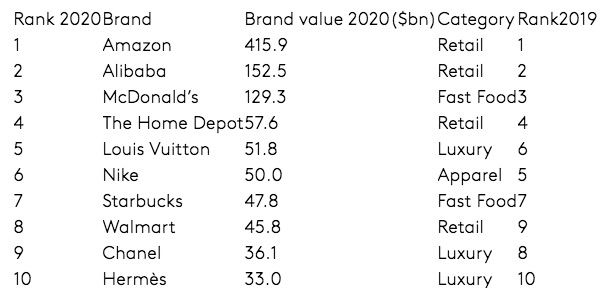The total value of the BrandZ Top 75 Global Retail Brands reaches $1.5 trillion as COVID-19 highlights the pivotal role of retail in the global economy. Even with the current coronavirus crisis, the value of the world’s top 75 retail brands has grown 12% to $1.5 trillion in the past year, according to the BrandZTM Top 75 Most Valuable Global Retail Brands Ranking 2020.
As economies around the world struggle under COVID-19 restrictions, the BrandZ ranking reveals the brands that are most likely to prevail in a post-coronavirus market. Indeed, historical BrandZ data confirms that brands with the strongest brand equity recovered nine times faster following the financial crisis of 2008.
David Roth, CEO of The Store WPP EMEA and Asia and Chairman of BrandZ, said: “The coronavirus crisis underscores the essential role that retail plays in both our daily lives and the overall global economy; we are seeing some heroic examples of retail companies stepping up to meet consumer need and keep the world turning. While this is a fast-moving and ongoing story, the report allows us to show the businesses that, having invested in becoming a strong brand, are potentially better able to withstand the current shock. Twenty-two years of BrandZ data analysis consistently confirms that strong brands help their businesses to survive turbulent times.”
Taking decisive action
Agile and innovative retail brands are taking action to make a difference to the lives of people confined to their homes and forced to change their habits; experience and data shows brands that maintain their visibility in a relevant and sensitive way throughout a crisis are best-placed for a faster recovery.
The top retailers in the 2020 ranking illustrate the scale and breadth of activity making brands meaningfully different and salient to consumers in the coronavirus age: Amazon (No. 1, $415.9 billion) is managing demand and reducing its speed of delivery to prioritise key products; Alibaba (No. 2, $152.5 billion) subsidiary Ali Cloud used its AI expertise to help medics in China significantly shorten the coronavirus diagnosis time; Louis Vuitton (No.5, $51.8 billion) parent company LVMH took only 72 hours to convert its production lines to make hand sanitizer; and Chinese ecommerce brand JD (No. 13, $25.5 billion) delivered medical supplies and food using its extensive distribution network.
Athletic apparel company Lululemon (No. 25, $9.7 billion) grew 40% to become the ranking’s highest riser; current activity includes offering online training programmes, a purposeful marketing tactic to keep it front-of-mind that has also been adopted by Adidas (No. 18, $14.8 billion).
Otherwise the fastest riser category is dominated by pure retail, as grocery outlets see a boom in demand as people stock up. Unsurprisingly, the digital-native brands scored highly – Amazon, JD and Alibaba were up 32%, 24% and 16% respectively – but physical retail veterans also showed their ability to adapt to an online-only environment. Costco (No. 11 $28.7 billion) grew 35%, Target (No. 23, $10.6 billion) was up 27%, Walmart (No. 8, $45.8 billion) increased 24% and Sam’s Club (No. 36, $6.8 billion) rose 19%.
Maintaining relevance
Smart retailers are also resisting the temptation to cut back on advertising investment, learning lessons from China where brands that ‘went dark’ are struggling to reconnect during the early stages of recovery as consumers opt for those that actively demonstrated support. Marketing is being adapted as people are confined to staying indoors, with tone of voice being as important as the media mix.
Graham Staplehurst, Global Strategy Director for BrandZ at Kantar, said: “Brand value isn’t just determined by financial performance, but also by reputation in the eyes of consumers. How retailers behave now in terms of helping people through the crisis, as well as the way in which they treat their staff and whether they comply with government and health advice, will be important to their survival. Those that have actively demonstrated their relevance and usefulness and continue to do so as consumers’ lives start to get back to normal, will be best-placed to strengthen customer relationships both in the recovery phase and the long-term.”
The BrandZ Top 10 Most ValuableRetail Brands 2020

Highlights in this year’s BrandZ Retail ranking include:
- The strongest got stronger: The Top 10 brands in the ranking outpaced the rest of the sector, posting an average rise in brand value of 16.4%. Amazon’s growth sees it account for 27% of the Top 75’s total brand value while robust performances by other Top 10 brands such as Alibaba show that strong brands can do more than get by; they can redefine what is possible.
- Sector leaders continued to dominate: McDonald’s (No. 3, $129.3 billion) is by far the most valuable Fast Food brand in the world, although others enjoyed rapid growth, thanks largely to delivery and other service innovations such as AI-powered suggestions at drive-throughs and delivery partnerships behind incremental orders. Louis Vuitton is the most valuable Luxury brand, with a new global flagship store in Seoul and creative partnerships with major artists while Nike (No. 6, $50.0 billion) leads the Apparel category with e-commerce, product customisation and collaborations driving strong sales.
- Five new entrants: Three Japanese brands make their debut in this year’s ranking; online fashion store Zozotown (No. 52, $4.5 billion), retail network Aeon (No. 64, $2.9 billion), and convenience story company Family Mart (No. 75, $2.4 billion). China’s ecommerce platform Pinduoduo (No. 26, $9.4 billion) is the highest new entry, following the success of its online group-buying model; Bunnings hardware chain from Australia (No. 69, $2.7 billion) is the fourth new entry.
Ian McGarrigle, Chairman of the World Retail Congress, said: “Retail has been on the frontline during the coronavirus lockdown, with millions of workers putting themselves at risk to serve their communities. Without their selfless effort the situation would be much worse and consumers will remember the brands and the staff who enabled society to continue to function. It highlights retail’s undisputed place at the cornerstone of people’s lives all around the world.”
Bron: Persbericht Kantar, 13 mei 2020

